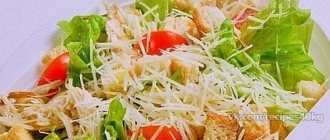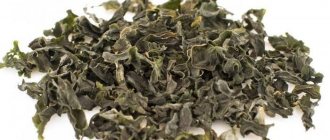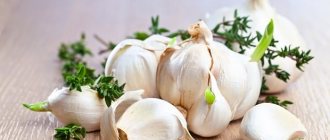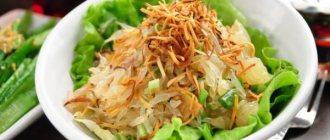General information
Is pineapple a fruit, vegetable or berry?
It's actually grass. Some breeders claim that it is a fruit, but they agree that the compound fruit is not a berry, vegetable or grain.
Content:
- General information
- Beneficial features
- Chemical composition
- The harm of exotics
- How to peel a pineapple
- Pineapple diet for weight loss
- Pineapple selection criteria
- Conclusion
When mature, the pineapple has a low, mundane stem with stiff, toothed leaves that reach 80 cm in length. The fruit of a tropical perennial is golden yellow. Depending on the variety, it can weigh 2–15 kg and reach 10–30 cm in height. Visually, the inflorescence resembles an oblong cone and consists of many ovaries. The top of the fruit is decorated with a green top.
The exotic fruit has a sweet and sour taste, which is why it is used in cooking as an additional ingredient in salads, pizza, desserts, candies and other dishes.
Pineapple plantations are concentrated in countries with subtropical and tropical climates. The world leaders in growing herbaceous plants are Costa Rica, Brazil and the Philippines [1].
How to store pineapple?
If you do not create ideal conditions for a ripe pineapple, you will not be able to store it for a long time. Maximum - 2 weeks, and even then in the refrigerator. Although ripe pineapples are usually stored at room temperature and humidity. True, no more than 3 days. This way their taste and smell remain intact. The main thing here is to eat the pineapple immediately after the first brown spots appear on the peel. Or better yet, even before they appear.
And remember: the lower the air temperature, the longer the shelf life. Ideal conditions for storing pineapples: 7-10 °C and 90% air humidity. In this case, it is advisable to wrap each fruit in paper.
You can preserve pineapples in another form - by canning or boiling, but that's a completely different story...
Beneficial features
The nutritional value of ripe fruit is unique. No other fruit has such an interesting composition. Pineapple is a combination of vitamins and microelements vital for the body (see paragraph “Chemical composition”), so it is rightfully considered a “tropical pharmacy”.
Effect on the body [2][3]:
- lowers blood pressure, thins the blood, dissolves cholesterol plaques;
- increases immunity, relieves inflammation of the nasopharynx, eases the course of the disease, suppresses cough, removes phlegm;
- improves metabolic processes in the body, improves digestion;
- binds free radicals in the body, prevents the spread of metastases;
- dissolves fibrin plugs in varicose veins;
- restores psycho-emotional balance, improves mood, fights stress, energizes;
- removes excess fluid from the body, promoting weight loss.
In addition, the exotic fruit has an anti-cellulite effect, so it is often included in body creams. It removes toxins, improves microcirculation in tissues, and also destroys fat deposits. This unique product helps eliminate excess oily skin and age spots, and also prevents inflammation, so it is used to care for the neck and face area. Masks and scrubs are made based on pineapple juice, which smooth and refresh the dermis, restore its elasticity, and cleanse the pores of the stratum corneum.
Pineapple helps in the treatment of many diseases, including [2][3]:
- arthritis;
- bronchitis;
- pneumonia;
- pancreatic diseases;
- pathologies of the liver and kidneys;
- myocardial infarction;
- hypertension;
- atherosclerosis;
- cardiovascular diseases;
- pathologies of the gastrointestinal tract;
- neurological disorders;
- ARVI;
- painful menstruation.
Harm and contraindications of pineapple
First of all, it must be said that unripe pineapple “burns” the skin, and you should not eat such fruits. A ripe pineapple is much less vigorous, but it can also cause harm to the body.
The harmful properties of pineapple are that:
- the high acidity of pineapple juice may well provoke an exacerbation of gastrointestinal diseases (ulcers, gastritis), because the mucous membranes of such people are greatly weakened
- again, due to the high acidity of the juice, pineapple corrodes tooth enamel
In principle, these are all proven harmful properties of pineapples, but there are others... For example, a number of experts consider unripe pineapple to be an abortifacient, which automatically classifies it as prohibited for pregnant women. Believe it or not – it’s up to you, but we believe that pregnant women should eat only what they want (when it comes to natural raw foods).
By the way, if you think the abortifacient effect of an unripe pineapple is real, then keep in mind that in industrial conditions, juice can be squeezed out of any fruit, including frankly green fruits. So think about whether it is worth using industrial substitutes with the proud name “Natural pineapple juice”.
And the last thing in this section: experts consider only 1 glass of pineapple juice per day (or 1 pineapple) safe, everything else is at your own peril and risk.
Chemical composition
85% of pineapple pulp consists of water and 15% of organic acids (citric, tartaric, malic) and monosaccharides (sucrose, fructose, glucose). In addition, the fruit contains vitamins, macro- and microelements, beta-carotene, fiber, and bromelain. Despite the high percentage of simple sugars (up to 18%), pineapple is a dietary product. 100 g of the edible part of a fresh fruit contains 52 kcal [4], canned – 60 kcal [5], dried – 281 kcal [6].
Fresh exotic fruit is quite filling due to its fiber, which instantly suppresses hunger, which is why the fruit is often used in weight loss diets.
The ratio of BJU (proteins, fats, carbohydrates) in pineapple pulp is 0.3: 0.1: 11.8 g per 100 g of product. Table No. 1 “Chemical composition of pineapple” [4]
| Nutrient name | Content, mg per 100 g of product pulp |
| Vitamins | |
| Ascorbic acid (C) | 11 |
| Niacin (RR) | 0,4 |
| Pantothenic acid (B5) | 0,16 |
| Pyridoxine (B6) | 0,1 |
| Thiamine (B1) | 0,06 |
| Retinol (A) | 0,003 |
| Riboflavin (B2) | 0,02 |
| Folic acid (B9) | 0,005 |
| Macro- and microelements | |
| Manganese | 0,818 |
| Potassium | 134 |
| Silicon | 93 |
| Rubidium | 0,063 |
| Sodium | 1 |
| Calcium | 17 |
| Phosphorus | 8 |
| Magnesium | 13 |
| Iron | 0,3 |
| Chromium | 0,01 |
Fresh exotic fruit is of greatest value to the human body. The canned fruit is deprived of all vitamins and microelements, and the dried fruit contains a colossal amount of sugar, which interrupts reasonable arguments about the benefits of such a product. Don’t be tempted by candied fruits either, as they are colored. In addition, the number of calories in them is off the charts, but the benefits are zero. As a result, products made from dried pineapple are veiled food waste that clogs the body.
Pineapple as an aid in diets
Pineapple can serve as an excellent assistant in the fight against excess weight, as it has a fairly low calorie content. Here are some useful recommendations for eating pineapple for this purpose:
- Using fresh pineapple is better than using any other version (jam, compote), since excess carbohydrates can only harm your figure.
- You can use pineapple to prepare light snacks, side dishes and desserts.
- Products present in the diet, except pineapple, should be low-fat and, of course, low in calories.
- During the diet, do not forget to take enough water.
- Using pineapple, those who want to lose weight can arrange so-called fasting days for their body. Such days should be held no more than once a week. What is one such important day like? A kilogram of pineapple is divided into 4 equal parts and eaten throughout the day. However, no other food is allowed. Such “unloading” will not only remove extra pounds, but will also help remove toxins from the body and strengthen the immune system.
The harm of exotics
Considering the fact that pineapple is a tropical fruit unusual for the human body, you need to treat it with caution.
It is dangerous to consume it in the following cases [7]:
- gastritis with high acidity;
- peptic ulcer;
- period of bearing a baby;
- increased sensitivity of tooth enamel;
- the presence of allergic reactions.
Remember: the high content of free organic acids (1.4%) has an irritating effect on the mucous membrane of the digestive tract, as well as on tooth enamel. To avoid tooth decay after eating an exotic fruit, rinse your mouth thoroughly. This will help neutralize the aggressive effect of acids on teeth.
The tropical herbaceous plant is a strong allergen, so it should be given to children aged 6 to 12 years in small quantities (30–50 g per day).
What are the benefits and harms of pineapple for pregnant women?
If you eat the exotic fruit in moderation, it has a beneficial effect on the body of the expectant mother, saturating it with potassium, magnesium, iron, and organic acids. In addition, it is able to overcome nausea and vomiting during toxicosis. The fruit increases hemoglobin levels, fights the dilation of the veins of the lower extremities, improves mood, and relieves heaviness in the stomach.
In the third trimester of pregnancy, pineapple should be consumed especially carefully, since during this period a woman experiences swelling. If consumed frequently, the fruit can cause uterine contractions. Unripe cone-shaped fruits have an abortifacient effect.
A safe dose of pineapple for pregnant women is 50–80 g of pulp [8].
Choose only a high-quality product (see paragraph “Criteria for choosing a pineapple”) and monitor the amount you eat - then the beneficial properties of the tropical fruit will be fully revealed.
What are the harms of pineapple?
May cause allergies
In some cases,
pineapple
may cause allergic reactions and diarrhea.
Severe itching due to allergies, skin rash
, abdominal pain and vomiting.
May worsen asthma symptoms
Some Research
Your Pineapple
Although it shows that it can treat asthma symptoms, this fruit may have the opposite effect in some people.
This may increase the risk of bleeding.
Bromelain may inhibit platelet aggregation and prevent blood clots.
This may increase the risk of bleeding in some people. also menstrual bleeding
may also increase.
immediately after surgery pineapple
Avoid using it. (Pineapple may improve post-operative recovery, but should be supervised by a doctor.)
Also, avoid using bromelain with prescription anticoagulants.
May cause miscarriage during pregnancy
Anecdotal findings pineapple
This suggests that it may cause a miscarriage.
Therefore, just in case during pregnancy and breastfeeding. eat pineapple
Avoid skin. Consult your doctor.
How to peel a pineapple
Some people believe that it is easier to cut the fruit into rings and remove the peel from each circle, while also removing the center. Others argue that this method of cutting leads to the loss of healthy juice, so they insist that you first need to remove the spiky shell, take out the middle with a green cap, then cut the fruit into pieces of the required size.
Let's look at the most effective method of peeling a pineapple (Thai):
- Trim the bottom of the fruit and place the fruit flat on a plate.
- Using a narrow, long knife, remove the skin into thin slices using smooth movements from top to bottom. As a result, dark eyes will remain on the “body” of the pineapple - don’t worry about it.
- At an angle to the continuous curved lines (diagonally), make cuts using a sharp knife on both sides.
- Remove the triangular strip and remove the remaining dark spines, exposing the flesh of the fruit. Repeat this procedure with the remaining rows of growths.
- Place the slices on a plate and serve.
How to eat pineapple
You should not combine fruit intake with dairy products, as this can lead to indigestion [3]. Nutritionists recommend eating fruits separately from other foods, but you should eat pineapple on an empty stomach with caution. It is best to eat the fruit between breakfast and lunch or as an afternoon snack.
Pineapple is added to minced meat, salads, and fried vegetables. It is used to make compote, cocktails, smoothies, jam, and fruit ice.
How to eat pineapple without it stinging in your mouth
The high content of organic acids in pineapple juice can cause discomfort in the mouth when consumed. How can you eat fruit without it stinging in your mouth? Take a few recommendations:
- Peel the pineapple pulp well, making sure to remove the eyes:
- cut the pineapple pulp into relatively small cubes so that you don’t have to bite off a large piece of the fruit and get dirty with the juice;
- refuse pineapple if you have damage or scratches in your mouth, if you have stomatitis, or after cleaning your tooth enamel;
- give preference to ripe fruits, whose juice is less pungent.
The cause of discomfort in the mouth when eating pineapple may be an allergy. If suspicion falls on her, she will have to stop eating the fruit.
Pineapple diet for weight loss
The fruit contains the natural proteolytic enzyme bromelain, which promotes the breakdown of proteins into amino acids, has a mild laxative effect, and also improves digestion. This compound is similar in its action to pepsin and trypsin, the lack of which disrupts the processes of processing and assimilation of proteins, which can lead to the accumulation of extra pounds.
Bromelain compensates for the deficiency of essential enzymes in the human body, preventing the development of obesity. In addition, pineapples have a diuretic effect and block the hunger center. As a result, it becomes easier to control your appetite.
To cleanse the body, nutritionists recommend pineapple fasting days once a week [9]. During the day, you should limit yourself to eating exotic fruits and herbal teas. To do this, peel the pineapple and cut it into four equal parts, which must be eaten throughout the day. In between taking the fruit, drink clean water, fruit infusions (from apples, plums), herbal teas (from corn silk, hellebore, bardakosh, senna, chicory).
A pineapple fasting day will help you get rid of 0.5 to 1 kg of excess weight [9]. This method of losing weight is contraindicated for people with high acidity of gastric juice or peptic ulcers.
After each use of a tropical plant, the mouth must be rinsed with water, otherwise the juice of the fruit may corrode the enamel of the teeth.
Pineapple with vodka for weight loss: is it a super effective remedy or a waste of money?
A tincture based on a tropical fruit is an economical way to quickly lose weight that does not require significant effort or investment. This remedy activates the digestion of food and also removes excess fluid from the body.
Recipe for the slimming elixir:
- Take a quality ripe pineapple, wash it, cut off the bottom and top with leaves.
- Cut it into 4-6 pieces without peeling, place in a blender bowl, and chop.
- Transfer the resulting mass into a glass jar, pour half a liter of vodka, cover with a lid, and place in a cool, dark place (refrigerator, cellar) for seven days.
- After a week, strain the mixture. Throw away the cake - it has already given up all the nutrients.
Take pineapple tincture twice a day, half an hour before meals, a tablespoon (15 ml). The weight loss course lasts three weeks. During this period, you can get rid of 8 to 10 extra pounds. This course is allowed to be conducted no more than three times a year.
Contraindications to using pineapple tincture for weight loss:
- pregnancy;
- lactation period;
- having an allergy to fruit;
- gastritis, stomach ulcer;
- cardiovascular problems;
- nervous disorders;
- cirrhosis of the liver;
- alcoholism;
- diabetes;
- hypotension.
The healing power and benefits of pineapple
Ripe fruits are a valuable food product. They are eaten raw and canned. They make candied fruits and jam.
Pineapple is a source of vitamins, minerals, and valuable enzymes. Bromelain, which has anti-inflammatory properties, is obtained from it. When used externally, it improves skin condition and accelerates the healing of minor injuries.
Most bromelain is found in the inedible parts of the fruit and the stem of the plant. You won’t be able to get a sufficient dose from the sweet pulp.
Here are the main beneficial properties of the fruit:
- Source of ascorbic acid . Vitamin C supports the immune system, helps relieve coughs, and protects against colds. This is the strongest antioxidant. It helps with skin problems and promotes collagen synthesis. True, there is less of it in pineapple than in oranges or cranberries.
- High fiber content prevents constipation and keeps you feeling full while consuming low calories. This helps cleanse and maintain normal weight.
- Protects against cardiovascular diseases . A study on rats conducted at the Lebanese University of Bilbos in 2005 showed that pineapple juice has cardioprotective effects. Doctors have concluded that regular consumption reduces blood viscosity, prevents the development of coronary disease, and prevents heart attacks.
- Improves mood, helps overcome depression . Pineapple is a source of tryptophan. This amino acid is used by the body to synthesize serotonin, the “happy hormone.” Together with B vitamins, this is a serious support for the nervous system.
- Helps digestion . Eating fruits helps break down proteins into peptides and amino acids. This alleviates the symptoms of acid reflux, colitis, and other gastrointestinal disorders.
Regular consumption of fruits cleanses the walls of blood vessels and inhibits the formation of cholesterol plaques.
The high manganese content makes pineapple a valuable product for those suffering from hypothyroidism. The element is involved in the synthesis of thyroxine, which they lack. Manganese also improves reproductive abilities, activates hematopoiesis, and regulates cholesterol levels.
Pineapple: benefits and harms for women's health
There are only 52 kilocalories in 100 grams. You can eat the product without worrying about your figure (that’s why I love it!). This is a great snack to take to work. It will keep you slim and protect against viruses and bacteria.
Potassium salts remove excess fluid. This eliminates swelling and promotes weight loss.
Pineapple pulp is a proven remedy for combating calluses. The slice is applied and fixed for several hours. The seal softens and is easy to remove (although I would advise going to a competent podiatrist).
Fresh juice is a remedy for seasickness, known since the times of the Spanish conquerors.
Pineapple is an ideal “tonic” for oily skin. To feel its rejuvenating properties, wipe your face or make a mask from the crushed pulp. Don't forget to test on the inside of your elbow first!
The benefits of pineapple for women lie in a complex of highly active chemical compounds that accelerate metabolism and activate fat burning. Fruits improve food absorption and promote weight loss.
Research shows that the fruits have anti-inflammatory and decongestant effects.
From time to time I come across fitness recipes for fasting days using pineapple. I am not a supporter of such extreme behavior. Why? Yes, because it is a lot of stress for the stomach, plus too much fiber and sugar. It is much more effective to give up baking and desserts for a while.
When to be careful?
Despite all its positive properties, pineapple is not harmless. It can bring not only benefits, but also harm:
- May cause irritation of the gastric mucosa and provoke an exacerbation of gastritis or peptic ulcer.
- Destroys tooth enamel. Avoid undiluted juice and rinse your mouth with water after eating. Again, purely theoretically. My opinion is that such yummy food cannot, by definition, do any harm.











